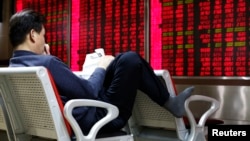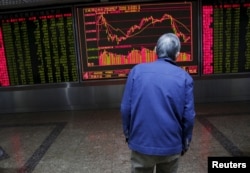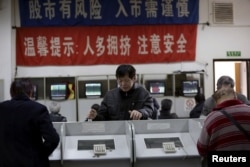China’s policymakers have launched an unprecedented campaign to counter growing speculation about the country’s massive flight of capital, further currency depreciation and the widespread concern about the country’s economic growth.
Analysts said the moves are a rare effort by officials to be more transparent about the economy as China prepares to host the G20 summit later this year and serve as the lead of the global grouping for the first time.
Over the past few days, Zhou Xiaochuan, governor of the People’s Bank of China, and three other top economic officials have issued detailed clarifications about the state of the economy, capital flight and the country’s currency.
Talking campaign
The talking campaign reflects Beijing’s concerns about the decline in investor confidence in the Chinese economy, analysts said.
In an interview with the prominent Chinese financial magazine Caixin, central bank governor Zhou candidly acknowledged these concerns when he discussed the role of currency speculators during an interview this week. He also admitted that Chinese companies were moving money out of the country or refusing to bring back their export earnings because it was more profitable to do so.
“Recently, there are people saying that China will adopt this or that capital control measure. Some are apparently spreading rumors to create panic among households and trade enterprises to the benefit of the speculators' bets,” Zhou said.
But, he added that China has no intention to impose inappropriate controls on cross-border transactions.
Andrew Batson, China research director of the consulting firm Gavekal Dragonomics, said there are other reasons why Chinese businesses are moving money out of the country.
One reason, he said, is the depreciating value of the Chinese currency, the Yuan, which is making it more attractive to hold their funds in U.S. dollars. Another is that Chinese companies are rushing to pay off their foreign currency debt before further depreciation makes their obligations more expensive.
Capital flight
On Tuesday, Long Guoqiang, vice president and research fellow of the State Council's Development Research Center, admitted capital flight posed a serious challenge to the country’s economy last year. Long also indicated that the government was forced to readjust its economic strategy to deal with the trend of Chinese businessmen moving funds to the United States.
“Last year, there was capital exodus to the U.S. from emerging economies. China was also affected,” Long told reporters at a special briefing on the economy. “It is natural for capital to pursue higher returns,” he said.
But, he added that “all governments need to keep a close watch on such capital outflows,” noting that China was not the only emerging country that was affected by the phenomenon last year.
Although the Chinese government has not disclosed the extent of money outflows, which is continuing this year, it has admitted the country’s foreign exchange reserves declined by $513 billion in 2015. The New York Times recently estimated that Chinese individuals and companies have moved about $1 trillion out of China in the past year and a half.
Long said capital outflows will peak this year because the prospects for the U.S. economy do not appear to be as optimistic as last year, and the U.S. Federal Reserve is expected to take a more realistic view on interest rates — a position in sharp contrast to what other observers have said and to expectations that interest rates will rise further in the United States, attracting more Chinese funds.
On Wednesday, however, the country’s Ministry of Commerce put an entirely different spin on the discussion when it said that China is not witnessing any signs of capital flight and that there is no basis for continued depreciation of the yuan.
Changing tunes
On December 26, just one day after many in the Western world were celebrating the Christmas holiday, China’s Communist Party released a propaganda song about the benefits of supply-side economics, releasing a rap song with a not so catchy name: “reform the supply side and upgrade the economy.” The slogan was coined weeks after President Xi Jinping spoke about supply-side economics for the first time.
However, the new emphasis on supply-side economics after nearly two years of campaigning to boost domestic demand left many economists and China observers confused. Even the official Xinhua news agency had to release an explanation.
On Tuesday, Long spent two hours discussing the concept with foreign journalists.
Some analysts believe the new slogan is just meant to reassure investors that there will be no curbs on investment, and the government wants them to invest in enhancing the supply of goods and services.
“It is not clear what are the practical implications of the idea. I hear a lot of things, read a lot of opinion articles about it. I really don't see any major change in the government’s approach to the economy,” said Batson of Gavekal Dragonomics.
In his interview with Caixin, Central Bank Governor Zhou said that, “going forward, China will strengthen structural reform, especially supply-side reform, in order to strike a better balance among economic growth, structural adjustment and risk prevention, and to achieve sustainable and steady development.”
One of China’s major problems is excess industrial capacity, which is increasingly unutilized because of a sharp decline in export demand. Some analysts are asking whether the new focus on supply-side reform would result in further increase in capacity, and accentuate the problem. At the same time, some economists disagree.
“These supply-side efforts are not focusing on areas of over capacity,” said Nicholas Lardy, the Anthony M. Solomon Senior Fellow at the Peterson Institute for International Economics. “It is an attempt to promote growth without relying so much on credit expansion to increase aggregate demand.”
Long said supply-side economic strategies will result in new investments in upgrading machinery and encouraging use of new and innovative technology.
He said there is a lot of room for such efforts, as a vast section of Chinese industry produce inferior goods. Many Chinese used imported school bags and toilet covers because they are not satisfied with goods made in the country, he pointed out.






